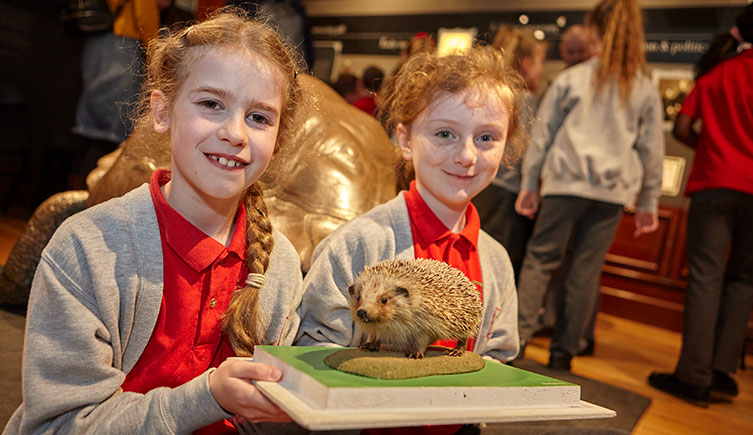How to book
To make a booking, please view the guidance on the Essential information for schools page, then use our online booking form.
Our school programme is very popular. We recommend booking at least a 6 weeks in advance.

Explore our workshops for students or download and print activity sheets in advance of your visit.
Our free workshops can accommodate up to 32 students at a time.
School visits, activities and workshops are free, but donations help support our vital work to look after nature and provide our learning programme. There is a recommended donation of £2 per child.
To make a booking, please view the guidance on the Essential information for schools page, then use our online booking form.
Our school programme is very popular. We recommend booking at least a 6 weeks in advance.
All workshops last around 45 minutes, unless otherwise noted.
Delve into prehistoric life and become detectives. Explore what the Earth was like around the age of the dinosaurs, what other animals existed and the process of fossilisation. Investigate real fossils to identify what they are and when they are from.
Suitable for lower KS2.
Please note there are no dinosaurs on permanent display at Tring.
Curriculum links:
Useful Museum resources:
Uncover why animals have skeletons and the variety of forms among animals. Focusing on vertebrate skeletons, predict what species the real skeletons come from.
Suitable for lower KS2.
Curriculum links:
Useful Museum resources:
This workshop is available from April to the end of July
Investigate the Museum’s pond to find out just how healthy it is.
Develop scientific skills to survey pond creatures; identifying them, assessing their bioindicator score and the water visibility. Consider how humans can positively and negatively impact ponds and what we can do to help.
Suitable for lower and upper KS2.
NB: This workshop is held outdoors and requires a ratio of 1:6. In the event of wet weather an alternative workshop will be offered, to be agreed when booking.
Curriculum links:
Discover the concept behind Carl Linnaeus’ classification system. Enhance your classification skills with this multi activity workshop:
Suitable for upper KS2.
Curriculum links:
Useful Museum resources:
Uncover species adaptations, explore oddities and generate species' future adaptations to help them to survive.
Suitable for upper KS2.
Curriculum links:
Useful Museum resources:
This workshop is available from April to the end of July
Explore urban nature on the Museum grounds and investigate the impacts humans are having. Carry out a fieldwork investigation to measure how invertebrates are impacted on in trampled and untrampled areas, and use specialist equipment to record results.
Suitable for Yr6
60 minutes
Curriculum links:
Useful Museum resources:
Our activity sheets encourage close observation of specimens on display. Please download and print these activity sheets prior to your visit. Clipboards are available to use around the galleries.
Encourage children to ask questions and discuss animal features with our self-guided tours. The tours are designed for use by an adult leading a small group of children. Please download and print these activity sheets prior to your visit.

Inspire your students to ponder their place within the natural world and explore the variety of life.